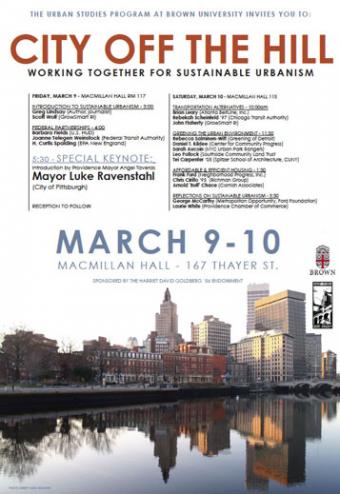PROVIDENCE, R.I. [Brown University] — Pittsburgh is a city that was brought back from the dead and reborn into a thriving metropolis. Pittsburgh Mayor Luke Ravenstahl will tell the story of his city’s renaissance in a keynote address during a two-day conference sponsored by the Urban Studies Program at Brown University March 9-10, 2012.
Providence Mayor Angel Taveras will introduce his colleague from Pittsburgh. Participants will explore how experts in different fields can work together to use housing, transportation systems and the natural environment to create more livable, sustainable cities. “The City Off the Hill: Working Together for Sustainable Urbanism” will take place at the MacMillan Hall on Brown’s Campus.
Experts from around the country will converge on Providence to map a strategy for sustainable urbanism. “This is a unique opportunity to hear from experts in housing, transportation, and environmental issues regarding what strategies have worked to transform aging cities and their infrastructures into vibrant, viable communities of tomorrow,” said Hilary Silver, director of Brown’s Urban Studies Program, whose students planned and pulled together the two-day conference.
The conference is designed to find fresh solutions to perennial problems — poverty, unaffordable and segregated housing, unemployment, economic change, and environmental degradation — through collaboration of people who differ in many ways, who may not be used to working together, or who even view one another as foes. Hence the title “Off the Hill” reflects the goal of the conference to integrate students, professors, experts, and community members to work together to find solutions to the problems of the nation’s aging cities and rebirth them in the spirit of Pittsburgh’s model.
Among the many topics to be covered are how to design greener housing, how to revitalize cities through partnerships, what the next generation of energy-efficient transportation will look like and how it fits into the whole, and how to take underutilized urban properties such as vacant lots and reconnect them to the natural world to make for higher-quality living spaces.
Greg Lindsay, a journalist who writes frequently about the intersection of transportation, urbanization, and globalization and author of Aerotropolis: The Way We’ll Live Next(with John D. Kasarda), will kick off the program with his views on how architecture, finance, and residents’ desires are inextricably linked. He will discuss how housing can be transformed by renovating existing underused properties to provide a better fit for current needs, what changes in financing and zoning will be needed to realize this transformation, and how community land trusts can play a role in making urban areas more neighborhood-like and functional.
Brian Leary, president and CEO of Atlanta BeltLine Inc, will launch day two. The BeltLine is a more than $3-billion project that will shape the way Atlanta grows over the next 25 years and beyond. When complete, it will provide a network of trails, transit, public art, and thousands of units of affordable housing along a historic 22-mile railroad corridor circling downtown Atlanta, connecting 45 neighborhoods directly to each other.
The two days will be rounded out with panel discussions that address transportation alternatives, affordable and efficient housing, how federal partnerships can provide development solutions, and the importance of bringing green back into the city. Each panel will include alumni of Brown’s Urban Studies Program who are urban professionals; undergraduates in the Urban Studies Program will chair the panels.
“I hope people leave this conference with a renewed appreciation for the importance and possibilities of collaborating to address the challenges that face today’s cities,” said Kate Blessing, an undergraduate in Brown’s Urban Studies program.
The event, made possible by the Harriet David Goldberg ’56 Endowment, is free and open to the public. The conference will begin Friday, March 9, at 2:30 p.m. in MacMillan Hall, Room 117, on the Brown campus. Ravenstahl’s keynote will begin at 5:30 p.m., followed by a reception. On Saturday, March 10, the conference will run from 10 a.m. to 4 p.m. For further information, contact Heather Parker 401-863-2090 or [email protected].

